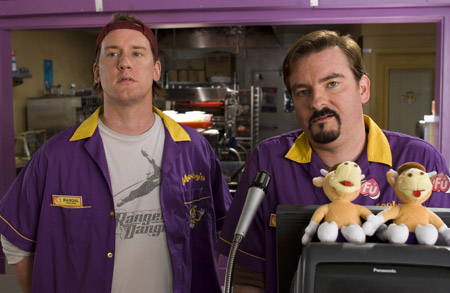Clerks II

A Warner Independent Pictures release.
There is a fine line between love of cinema, and pseudointellectual masturbation. “Clerks II” is certainly not the first film to walk the tightrope between the two… but it may very well be one of the few in which doing so lends purpose to the narrative. I didn’t think about it until after the movie was over, because one has to see where it goes to appreciate that, intentionally or not, it starts so badly.
We’re reunited with the easily subjugated, soon to be married, Dante Hicks (Brian O’Halloran) and his long-time friend, Randal Graves (Jeff Anderson), who seems to have been put on this earth to annoy the hell out of every living being. Hicks has been working at Quick Stop since the beginning of time, give or take a few years. His world is redefined when he turns up at work to discover the establishment is in flames. Randal, of course, left the coffee burner on. What was near the coffee burner to ignite the entire building is never offered… but it’s relatively unimportant.
What’s material about this introduction is that the film is ultimately about change, and our fear of it. I say this to you as I’m turning 32 next month, and like Dante I periodically have pre-midlife crises of my own—looking at flab, counting the grey hairs mounting an attack on my scalp. I can equate the relationship between Dante and Randal to at least one close friendship I have had since college. Now both in our thirties, my friend and I often find it both amusing and disturbing to reflect on the ways in which we’ve changed—grocery shopping on a Saturday evening, for example, or discussing the price of shirts at the local discount store. But I’m getting off the beaten path here.
The movie drags at first because too much time is spent on self-referential dialogue and situations, some of which are fairly obscure and add quirkiness but give little reason for a first-timer to care—e.g. the Julie Dwyer incident. If you don’t know who Julie Dwyer is, a) it’s not critical to the story, and b) then you understand my point. Kevin Smith’s flaw is that he is part of that revolving door of young film makers who, throughout the decades, have amused themselves by condescending to audiences with their knowledge of trivial references to stories, characters and banal cinematic techniques (watch for a heated argument between Randal and Dante where the camera tracks in circles around them for at least two or three minutes). The fallacy, repeated by countless directors, is in assuming that referencing a bad cliché is somehow funnier than seeing the original, unintentionally funny execution. There are also the requisite cameos (Jason Lee and Ben Affleck) who have no cause to be there other than to make die-hard Smith fans snicker and grin, as well the return of the smug partners in crime, Jay (Jason Mewes) and Silent Bob (Smith). However, the film eventually grows out of its in-jokes.
One of the recurring themes in Smith’s movies is a running debate about which “Star Wars” film, “Return of the Jedi” or “The Empire Strikes Back,” is better. After the Quick Stop is closed from the fire, Randal and Dante go to work at Mooby’s (an all-encompassing spoof of fast-food chains) under the management of Becky (Rosario Dawson). It’s here that a young, some might say socially inept, new hire, Elias (Trevor Fehrman) and Randal get into a fracas over epic trilogies, namely “Star Wars” versus “Lord of the Rings.” Even though this most notorious of ongoing internet debates is played out behind the Mooby’s counter with considerable exaggeration, Smith is basically addressing the culture-clash between twenty-somethings and thirty-somethings (including me; the first film I saw was “Star Wars”). This becomes a springboard for the pre-midlife crisis that Dante is having, but doesn’t want to, and that Randal is first avoiding but eventually confronts. Note that despite their philosophical differences, Randal and Dante connect in a scene in which the two take an extended break from work to hit a go-karting track. When Dante asks Randal why he suddenly had the urge to do so, Randal replies that it reminds him of how much simpler childhood was.
The turning point is Dante’s serious conversation with Becky about his future plans. From there, the movie finds its narrative center and becomes a real story about real people and, suddenly, you find you even care about Randal. And this is the point I alluded to earlier. While it tests one’s patience to sit through one sophomoric joke after another, the growth of the film parallels the growth of the lead characters and, perhaps, Kevin Smith’s.
It’s as if Smith is, whether intentionally nor not, telling us that film making has come full circle for him. Since his financial and popular success, he’s been accused by many of selling out for seeming to divert away from his earlier tone in films like “Mallrats,” yet never quite getting a solid footing in more serious fare. But somewhere along the way, perhaps, he’s found a happy medium — combining what he knows now with what he wanted out of life then, and being, to paraphrase Roger Ebert’s review of “Groundhog Day”, not necessarily a different person, but a better Kevin Smith.
Oh, and by the way, the only rational answer is “Empire.” Duh.
 Clerks II • Dolby® Digital surround sound in select theatres • Aspect Ratio: 1.85:1 • Running Time: 97 minutes • MPAA Rating: R for pervasive sexual and crude content including aberrant sexuality, strong language and some drug material. • Distributed by MGM/The Weinstein Co.
Clerks II • Dolby® Digital surround sound in select theatres • Aspect Ratio: 1.85:1 • Running Time: 97 minutes • MPAA Rating: R for pervasive sexual and crude content including aberrant sexuality, strong language and some drug material. • Distributed by MGM/The Weinstein Co.